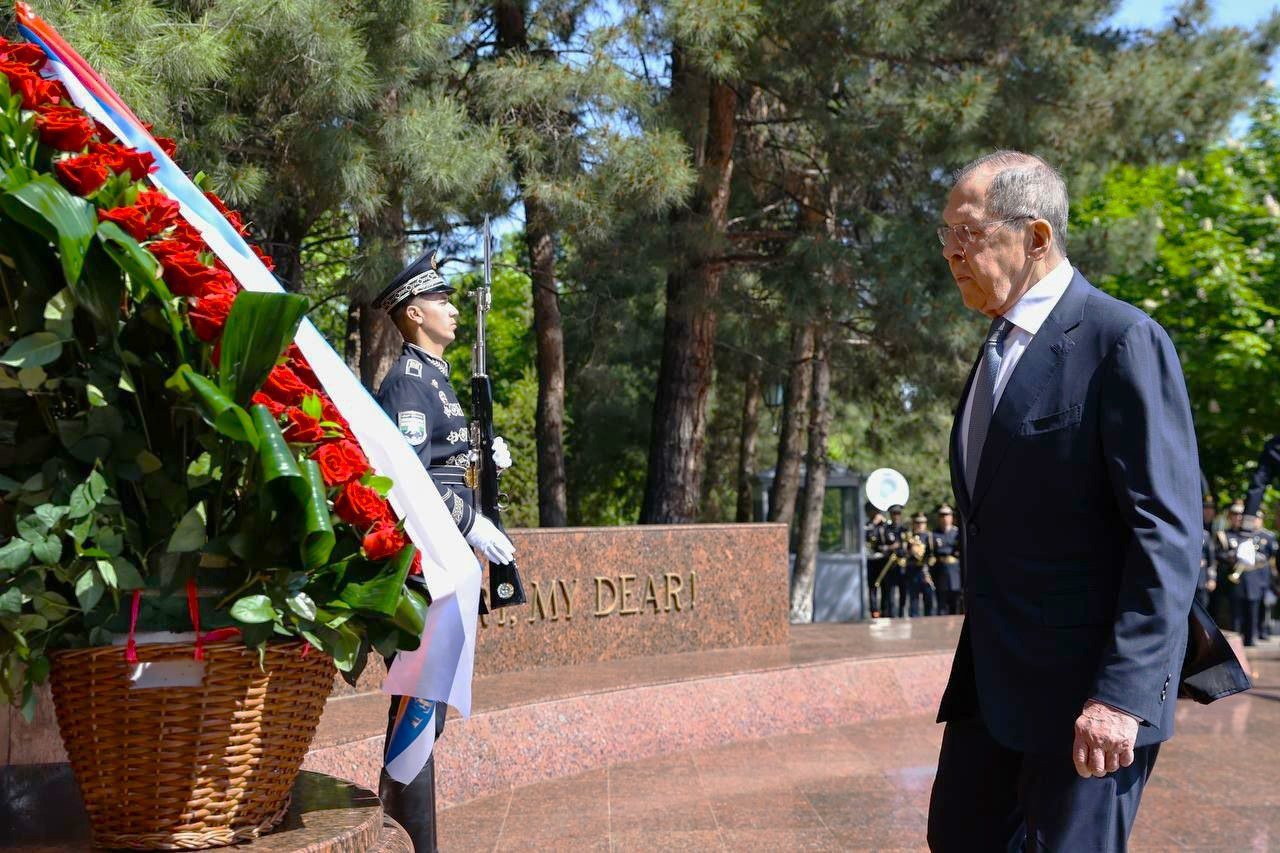
Russian Foreign Minister Sergey Lavrov’s official visit to Uzbekistan this week has triggered significant public and political responses, particularly after remarks he made during a visit to the Motamsaro Ona (Grieving Mother) memorial in Samarkand.
While at the memorial, which honors Uzbek soldiers who died during World War II and features inscriptions in Uzbek and English, Lavrov pointed out the absence of a Russian-language text. “There is an inscription in English, but I didn’t see one in Russian. A mother is the most sacred figure,” Lavrov reportedly told his tour guide, according to TASS. Uzbekistan’s Foreign Minister Bakhtiyor Saidov was present during the exchange.
Photographs released by the Russian Foreign Ministry show Lavrov laying flowers at the site, accompanied by an honor guard.
Lavrov was in Uzbekistan for a two-day official visit. On April 23, he met with President Shavkat Mirziyoyev to discuss bilateral ties and regional cooperation, including trade, energy, and security issues.

Sergey Lavrov lays flowers at the Grieving Mother memorial in Samarkand; image: MFA Russia
Domestic Responses to Lavrov’s Remarks
Lavrov’s observation about the memorial sparked criticism from several Uzbek public figures. Alisher Qodirov, a member of parliament and leader of the Milliy Tiklanish (National Revival) party, stated that “Russian politicians seem to be trying every possible way to portray Uzbekistan as disrespectful to Russian language and culture… Lavrov surely understands that forced respect and invented needs only create the opposite effect.”
Sherzodkhon Qudratkhodja, rector of the University of Journalism and Mass Communications of Uzbekistan, was similarly outspoken. “It is inappropriate for a Foreign Minister from another country to come here and criticize us,” he said. “After all, we are not their colony.”
Qudratkhodja further criticized Russia’s treatment of Uzbek labor migrants. “Why are our migrants in Russia discriminated against? Why do Russian officials remain silent when local authorities, migration services, or police violate their basic human rights?” he asked. “If Mr. Lavrov wants to speak about sacred symbols like mothers, Uzbekistan can remind him that human rights are sacred, too.”
Mutual Recriminations and Educational Policy
Lavrov also addressed Uzbekistan’s engagement with the EU, prompting a further response from Qudratkhodja. “No one has the right to interfere in Uzbekistan’s internal affairs,” he said. “This includes independently determining our level of relations with the European Union. It demonstrates our state’s multi-vector foreign policy.”
Coinciding with Lavrov’s visit, Uzbekistan’s Ministry of Preschool and School Education introduced a new requirement: all graduating students, including those from non-Uzbek-language schools, must now pass an exam in the Uzbek state language, a move widely viewed as part of broader efforts to reinforce national identity.
At a joint press conference, Lavrov emphasized the closeness of Uzbekistan-Russia relations. “You feel this closeness when you are here, not only at the official level but also at the human level,” he said. Foreign Minister, Saidov responded by underscoring Uzbekistan’s balanced diplomacy: “Our country does not compare friends. We are close to all our strategic partners and friendly countries.”
Labor Migration and Energy Cooperation
Lavrov further addressed the challenges surrounding labor migration, asserting that workers from Central Asia should have a strong command of Russian and be aware of Russian laws. “We must prevent the growth of criminal behavior among migrants. Many such cases are happening today,” he said. Nonetheless, Lavrov acknowledged that reducing migrant numbers would not be in Russia’s interest, given the country’s labor needs.
On economic cooperation, Lavrov highlighted plans to double the volume of gas exports from Russia to Uzbekistan through ongoing infrastructure projects. He noted that Russian investments currently account for nearly 18% of Uzbekistan’s total trade turnover. “There are over 115 investment projects worth more than 3.2 trillion rubles ($38.5 billion) underway,” Lavrov stated.
He also cited progress on a flagship bilateral initiative: the construction of Uzbekistan’s first nuclear power plant, with implementation “practically ongoing” since the agreement was signed last year.
Russia, the EU, and Geopolitical Tensions
Lavrov criticized Western efforts to increase their geopolitical influence in Central Asia, particularly through partnerships such as the Central Asia-EU summit. “We are categorically against politicizing cooperation processes and introducing ideological elements associated with Western attempts to dominate,” he said, accusing the EU of funding projects aimed not at mutual development but at accessing sensitive sectors such as customs and border management.
Despite these criticisms, Lavrov stressed that Russia respects the sovereignty of its neighbors. “We will never allow ourselves to interfere in the domestic affairs of other countries,” he claimed, amid ongoing scrutiny over Moscow’s role in the region.
Lavrov also announced that the next Central Asia-Russia summit will take place in October in Dushanbe, coinciding with the broader CIS summit. The event will build on discussions held at the April 11 meeting of regional foreign ministers in Almaty, part of the Central Asia Five plus Russia mechanism.
The first such summit was held in October 2022 in Astana, Kazakhstan.
